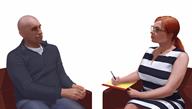Post-Traumatic Stress Disorder, Adult
Post-traumatic stress disorder (PTSD) is a mental health condition. It may start after a life-changing event or trauma. PTSD can also occur in people who hear about trauma that happens to a close family member or friend.
What are the causes?
Events that can cause PTSD include:
Situations where your life is in danger, such as in motor vehicle accidents or plane crashes.
Violent crimes, such as kidnappings or public shootings.
Disasters caused by nature or humans, such as fires or floods.
Physical assault.
Sexual assault.
Any kind of abuse.
PTSD can also occur after witnessing a violent event. This may be:
What increases the risk?
You are more likely to develop this condition if:
What are the signs or symptoms?
PTSD symptoms may start soon after a traumatic event or weeks later. They can last from a month to years. Symptoms can affect relationships, work, and daily activities. They may include:
Intrusive symptoms
This is when you relive the trauma through:
Dreams.
Feelings of fear, horror, intense sadness, or anger.
Unwanted memories.
Physical reactions. These can include a fast heart rate, shortness of breath, sweating, and shaking.
Flashbacks, or feeling like the past event is happening in the present.
Avoidance symptoms
This is when you avoid anything that reminds you of the trauma. You may:
Increased arousal symptoms
You may be very sensitive or react to certain settings. You may:
Be easily startled.
Behave in a careless or self-destructive way.
Become irritated easily.
Feel worried and nervous.
Have trouble focusing.
Yell at or hit other people or objects.
Have trouble sleeping.
Negative mood and thoughts
You may have negative thoughts and feelings about yourself and others. You may:
Believe that you or others are bad.
Not be able to remember certain parts of the traumatic event.
Blame yourself or others for the trauma.
Be unable to feel positive emotions, like happiness or love.
How is this diagnosed?
PTSD is diagnosed through an assessment by a mental health professional. You will be asked questions about your symptoms.
How is this treated?

Treatment may include:
If you have other mental health problems, these can also be treated.
Follow these instructions at home:
Alcohol use
-
Do not drink alcohol if:
Your health care provider tells you not to drink.
You are pregnant, may be pregnant, or are planning to become pregnant.
- If you drink alcohol:
- Limit how much you have to:
Know how much alcohol is in your drink. In the U.S., one drink equals one 12 oz bottle of beer (355 mL), one 5 oz glass of wine (148 mL), or one 1½ oz glass of hard liquor (44 mL).
Activity
-
Exercise regularly. Try to do at least 30 minutes of physical activity most days of the week.
- Practice ways to calm yourself, such as:
-
Do not cut yourself off from other people. Make connections.
-
Think about volunteering. This can help you feel more connected.
Lifestyle
-
Find a support group. Groups are often available for military veterans, trauma victims, and family members or caregivers.
- Try to get 7–9 hours of sleep each night. To help with sleep:
Keep your bedroom cool and dark.
Do not eat a heavy meal within 1 hour of bedtime.
Avoid caffeine for at least 8 hours before bed.
Avoid screen time before bed. This includes television, computers, tablets, and mobile phones.
-
Do not useillegal drugs.
-
Contact a local organization to find out if you are eligible for a service dog.
General instructions
-
Take over-the-counter and prescription medicines only as told by your health care provider.
-
Take steps to help yourself feel safer at home. Think about putting a security system in your home.
-
Work with a health care provider or therapist to help manage your symptoms.
-
If your PTSD affects your marriage or family, get help from a family therapist.
-
Let others know that you have PTSD. Tell them what may trigger symptoms. This can protect you and help others understand you better.
-
Let all of your health care providers know you have PTSD. This is important if you are having surgery or need to go to the hospital.
Contact a health care provider if:
-
Your symptoms do not get better.
-
You feel overwhelmed by your symptoms.
-
You have trouble doing daily tasks.
-
You have loss of appetite.
-
You have trouble sleeping.
Get help right away if you feel like you may hurt yourself or others, or have thoughts about taking your own life. Go to your nearest emergency room or:
Summary
-
Post-traumatic stress disorder (PTSD) is a mental health condition. It is more likely to start after a life-changing event or trauma.
-
Treatment for PTSD may include medicines and therapy.
-
Find a support group in your community.
-
Get help right away if you have thoughts of hurting yourself or others.
This information is not intended to replace advice given to you by your health care provider. Make sure you discuss any questions you have with your health care provider.
 Treatment may include:
Treatment may include: